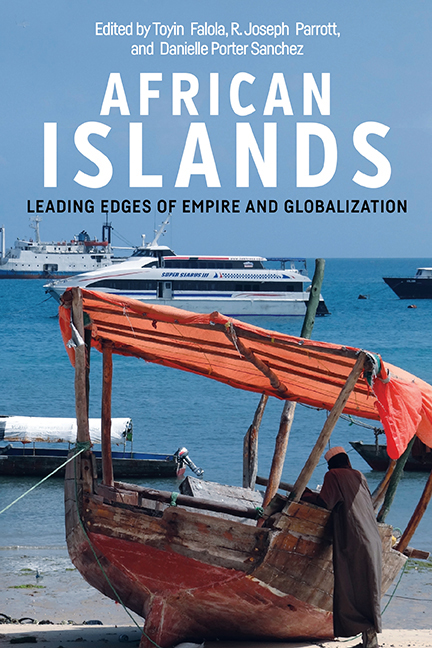Book contents
- Frontmatter
- Dedication
- Contents
- Introduction: Arbiters and Witnesses of Change: Contextualizing Conversations on African Islands
- Part 1 Atlantic Ocean Islands
- Part 2 Indian Ocean Islands
- 8 Africa's Indian Ocean Islands, Near and Distant
- 9 Monsoon Metropolis: Migration, Mobility, and Mediation in the Western Indian Ocean
- 10 The Mascarenes, Indian Ocean Africa, and Global Labor Migration during the Eighteenth and Nineteenth Centuries
- 11 The Island as Nexus: Zanzibar in the Nineteenth Century
- 12 Slavery and Postslavery in Madagascar: An Overview
- 13 The Comoros: Strategies of Islandness in the Indian Ocean
- 14 Gendered Pioneers from Mayotte: An Ethnographic Perspective on Travel and Transformation in the Western Indian Ocean
- Notes on Contributors
- Index
12 - Slavery and Postslavery in Madagascar: An Overview
from Part 2 - Indian Ocean Islands
Published online by Cambridge University Press: 31 August 2019
- Frontmatter
- Dedication
- Contents
- Introduction: Arbiters and Witnesses of Change: Contextualizing Conversations on African Islands
- Part 1 Atlantic Ocean Islands
- Part 2 Indian Ocean Islands
- 8 Africa's Indian Ocean Islands, Near and Distant
- 9 Monsoon Metropolis: Migration, Mobility, and Mediation in the Western Indian Ocean
- 10 The Mascarenes, Indian Ocean Africa, and Global Labor Migration during the Eighteenth and Nineteenth Centuries
- 11 The Island as Nexus: Zanzibar in the Nineteenth Century
- 12 Slavery and Postslavery in Madagascar: An Overview
- 13 The Comoros: Strategies of Islandness in the Indian Ocean
- 14 Gendered Pioneers from Mayotte: An Ethnographic Perspective on Travel and Transformation in the Western Indian Ocean
- Notes on Contributors
- Index
Summary
As Igor Kopytoff has well shown, historians were the first to document the specificities of African and Asian systems of slavery in the mid-twentieth century. Anthropologists at that time were reluctant to tackle this subject since they were preoccupied with rehabilitating the much-maligned reputation of the people they studied. As their unease with the topic faded away, a number of pioneering studies appeared that confronted slavery. Their authors were primarily concerned with the question of a universal definition of slavery, that is, one that would be applicable to non-Western societies, as well as with the local definitions of slave status and the reconstruction of past indigenous systems of slavery; they also discussed issues such as the Marxian approach to slavery as a mode of production and the cultural variations in systems of slavery. In the mid-1990s, however, the research agenda on slavery was significantly impacted and reshaped by a major UNESCO project, launched in 1994 and called the Slave Route, which supported the worldwide organization of academic conferences and exhibitions on slavery and the slave trade, and the publication of books on the subject. The interests of anthropologists and historians shifted during this period from questions of slavery as an aspect of indigenous social organization and a mode of production to questions about the cultural implications of enslavement and the trade, especially in the construction of social memory and identity. Indeed, during this period ethnographies and historical accounts dealing with slavery increasingly focused on its remembrance.
These global trends have also been followed in Malagasy and Indian Ocean scholarship. In Madagascar, two major conferences were organized as a direct consequence of the UNESCO project: the first, held in Antananarivo in 1996, commemorated the 100th anniversary of the colonial abolition and was mostly concerned with documenting past slavery and its legacy in the present; the second, held in Toamasina in 1999, addressed the topic of slavery and the slave trade on the East Coast. During these meetings it became apparent that the scientific study of slavery and postslavery raised specific concerns in Madagascar because of the concomitance of the colonial conquest (1895) and the abolition (1896), which means that both events are often closely associated, not least because Malagasy slavery provided a convenient moral justification for the French takeover.
- Type
- Chapter
- Information
- African IslandsLeading Edges of Empire and Globalization, pp. 345 - 369Publisher: Boydell & BrewerPrint publication year: 2019
- 1
- Cited by

